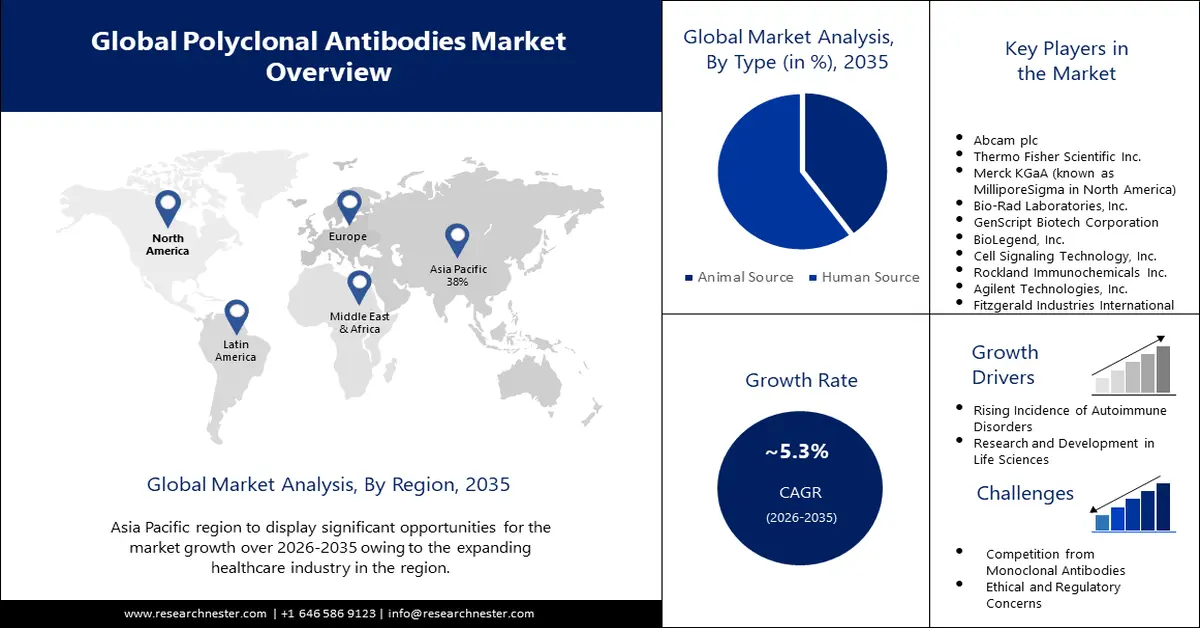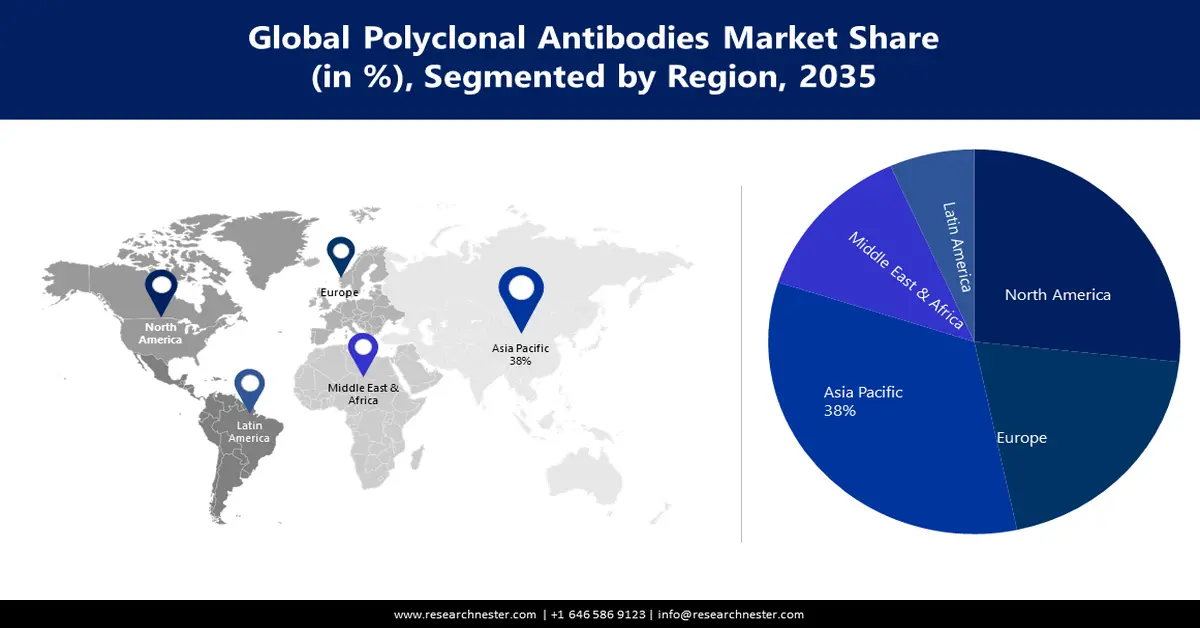Polyclonal Antibodies Market Outlook:
Polyclonal Antibodies Market size was valued at USD 1.72 billion in 2025 and is likely to cross USD 2.88 billion by 2035, registering more than 5.3% CAGR during the forecast period i.e., between 2026-2035. In the year 2026, the industry size of polyclonal antibodies is assessed at USD 1.8 billion.

The market expansion is due to the projected need for therapeutic applications, as polyclonal antibodies find extensive use in therapeutic applications, notably in the development of antivenom and immunoglobulin therapies, which can help in preventing hemolytic disease in newborns while modifying inflammatory reactions.
According to a report, about 25% of newborns suffer from hemolytic disease of the newborns (HDN), which requires transfusion. Due to this, this industry is expected to witness a substantial growth rate in the forecasted years.
In addition, adopting polyclonal antibodies is particularly important in cases where the multifaceted nature of diseases necessitates a comprehensive immune response. For instance, in antivenom therapy, polyclonal antibodies are harnessed to neutralize the venom components of various snake species effectively.
Key Polyclonal Antibodies Market Insights Summary:
Regional Highlights:
- Asia Pacific polyclonal antibodies market achieves a 47% share by 2035, driven by the extensive use of polyclonal antibodies in immunohistochemistry and their role in diagnostic and therapeutic interventions.
Segment Insights:
- The human source segment in the polyclonal antibodies market is expected to achieve a 54% share by 2035, attributed to the reduced immunogenicity and higher safety profile of human-derived antibodies.
- The hospitals segment in the polyclonal antibodies market is anticipated to achieve a tremendous share by 2035, driven by growing use of polyclonal antibodies in immunotherapy and point-of-care testing.
Key Growth Trends:
- Technological advancements in antibody production
- Increase in cancer disease
Major Challenges:
- Technological advancements in antibody production
- Increase in cancer disease
Key Players: Abcam plc, Thermo Fisher Scientific Inc., Merck KGaA, Bio-Rad Laboratories, Inc., GenScript Biotech Corporation, BioLegend, Inc., Cell Signaling Technology, Inc., Rockland Immunochemicals Inc., Agilent Technologies, Inc., Fitzgerald Industries International.
Global Polyclonal Antibodies Market Forecast and Regional Outlook:
Market Size & Growth Projections:
- 2025 Market Size: USD 1.72 billion
- 2026 Market Size: USD 1.8 billion
- Projected Market Size: USD 2.88 billion by 2035
- Growth Forecasts: 5.3% CAGR (2026-2035)
Key Regional Dynamics:
- Largest Region: Asia Pacific (47% Share by 2035)
- Fastest Growing Region: Asia Pacific
- Dominating Countries: United States, China, Germany, Japan, United Kingdom
- Emerging Countries: China, India, Japan, South Korea, Brazil
Last updated on : 16 September, 2025
Polyclonal Antibodies Market Growth Drivers and Challenges:
Growth Drivers
-
Technological advancements in antibody production - The continuous evolution of polyclonal antibody production technologies, along with several technological advancements, has lucratively improved the efficiency and demand of manufacturing processes while ensuring a consistent supply of high-quality polyclonal antibodies to consumers. According to a report, in the U.S., more than 24 million people are affected by more than 80 different types of autoimmune diseases. Moreover, innovations in antibody purification, expression systems, production platforms, and many more have streamlined their manufacturing procedures while reducing production costs and improving overall product quality. This has had a substantial effect on market growth as pharmaceutical and biotechnology companies are increasingly turning towards advanced technologies for the development and production of polyclonal antibodies. In addition, the increasing incidence of diseases such as rheumatoid arthritis, lupus, and multiple sclerosis has led to a surge in research and development activities that are focused on the demand for polyclonal antibodies for effective treatment. According to the American Autoimmune Related Diseases Association (AARDA), approximately 50 million Americans suffered from autoimmune diseases as of 2021.
- Increase in cancer disease - Since polyclonal antibodies are produced by B cells in response to an antigen, such as malignant cells, the market share for these antibodies is slated to expand at a lucrative rate, which can be attributed to the rise in cancer cases. According to a report, there were about 20 million new cancer cases in 2022 and about 9.7 million deaths caused by cancer. Furthermore, driven by the disease's global rise, there is a strong need for both accurate and effective cancer treatments as well as diagnostics. The production of high-quality antibodies in large quantities has also become easier and more economical with the advent of new technology for the production and purification of polyclonal antibodies. This has increased the range of polyclonal antibodies for clinical as well as research applications, which has further fueled market demand.
- Research and development in life sciences - The ongoing advancements in life sciences research contribute substantially to the growth of the polyclonal antibodies market. Polyclonal antibodies play a crucial role in various research applications, such as Western blotting, immunohistochemistry, and flow cytometry. The expanding scope of life sciences research, including genomics, proteomics, and cell biology, demands reliable and versatile tools like polyclonal antibodies. This increasing demand for antibodies in research applications fuels the growth of the market, with academic institutions, research laboratories, and biotechnology companies actively contributing to the expanding landscape.
Challenges
- Availability of different options - Polyclonal antibodies, which are derived from the immune responses of multiple organisms, can lead to several differences in the antibody composition, and this variability can highly impact the reproducibility and consistency of such experimental results. This can pose many challenges in research and diagnostic applications.Furthermore, the dominance of monoclonal antibodies in certain therapeutic and diagnostic applications poses a challenge for the polyclonal antibody landscape. Monoclonal antibodies also offer a much more targeted approach, coupled with higher specificity and reduced variability compared to polyclonal antibodies. This can act as a restraining factor for the growth rate of this sector.
- High competition from monoclonal antibodies can cause hindrance.
- Increasing ethical and regulatory concerns
Polyclonal Antibodies Market Size and Forecast:
| Report Attribute | Details |
|---|---|
|
Base Year |
2025 |
|
Forecast Period |
2026-2035 |
|
CAGR |
5.3% |
|
Base Year Market Size (2025) |
USD 1.72 billion |
|
Forecast Year Market Size (2035) |
USD 2.88 billion |
|
Regional Scope |
|
Polyclonal Antibodies Market Segmentation:
Type Segment Analysis
The human source segment in the polyclonal antibodies market is estimated to gain revenue of about 54% by 2035. The segment influence can be attributed to the pursuit of enhanced immunogenicity and specificity, as human-derived antibodies have a natural advantage in clinical and therapeutic applications as they are less likely to provoke an immune response when tested on humans.
Additionally, this characteristic is particularly crucial in therapeutic interventions, ensuring greater safety and reducing the risk of adverse reactions. Human-derived polyclonal antibodies offer reduced cross-reactivity and improved safety profiles, making them increasingly attractive for therapeutic use. Cross-reactivity, often encountered with animal-derived antibodies, can lead to unintended side effects.
By sourcing antibodies from humans, the likelihood of unwanted interactions and adverse events is minimized, aligning with the stringent safety requirements in clinical settings. The increasing emphasis on personalized medicine has emerged as a significant growth driver for human-sourced polyclonal antibodies.
End Users Segment Analysis
The hospital segment in the polyclonal antibodies market is expected to garner a tremendous share by the end of 2035. As polyclonal antibodies are highly used in hospitals for therapeutic purposes, particularly in immunotherapy, because they play a crucial role in modulating immune responses, this makes them a valuable component in the treatment of various diseases, including certain cancers and autoimmune disorders. The application of polyclonal antibodies in immunotherapy widens the therapeutic options available to hospitals for managing complex medical conditions.
A clinical trial review reported a 30% improvement in overall response rates in cancer patients treated with immunotherapies incorporating polyclonal antibodies. Advancements in point-of-care testing within hospitals are facilitated by the use of polyclonal antibodies. The rapid and reliable results obtained through point-of-care tests contribute to timely diagnosis and treatment decisions. The flexibility of polyclonal antibodies in various testing formats enhances their applicability in point-of-care settings, supporting hospitals in providing efficient and patient-centric healthcare services.
Our in-depth analysis of the global polyclonal antibodies market includes the following segments:
|
Type |
|
|
End-user |
|
|
Source |
|
|
Product Type |
|
|
Application |
|

Vishnu Nair
Head - Global Business DevelopmentCustomize this report to your requirements — connect with our consultant for personalized insights and options.
Polyclonal Antibodies Market Regional Analysis:
APAC Market Insights
The polyclonal antibodies market in the Asia Pacific region is set to hold the largest share of about 47% by the end of 2035. This sector is poised to propel in the region and is expected to drive on account of the extensive use of polyclonal antibodies in immunohistochemistry (IHC), a technique crucial for the examination of tissue samples. Hospitals leverage IHC for the diagnosis of various cancers and pathological conditions.
Moreover, the versatility of polyclonal antibodies in recognizing multiple antigens makes them invaluable in IHC applications, enabling hospitals to obtain comprehensive and detailed information from tissue specimens. Polyclonal antibodies play a crucial role in hospitals during infectious disease outbreaks. They are utilized for the rapid development of diagnostic tests and potential therapeutic interventions. During the Zika virus outbreak, hospitals incorporating polyclonal antibodies in diagnostic assays reported a 20% faster identification of infected individuals compared to hospitals using alternative testing methods.
North American Market Insights
The North American region will also encounter a huge impact on the polyclonal antibodies market size expansion in the coming years and will hold the second position owing to the rising prevalence of chronic diseases such as cancer, cardiovascular diseases, and autoimmune disorders, which would drive the need for advanced diagnostic tools and targeted therapeutic interventions, where polyclonal antibodies will find extensive applications.

Polyclonal Antibodies Market Players:
- Abcam plc
- Company Overview
- Business Strategy
- Key Product Offerings
- Financial Performance
- Key Performance Indicators
- Risk Analysis
- Recent Development
- Regional Presence
- SWOT Analysis
- Thermo Fisher Scientific Inc.
- Merck KGaA
- Bio-Rad Laboratories, Inc.
- GenScript Biotech Corporation
- BioLegend, Inc.
- Cell Signaling Technology, Inc.
- Rockland Immunochemicals Inc.
- Agilent Technologies, Inc.
- Fitzgerald Industries International
Recent Developments
- Xenothera- announced their recent evidence which supports the importance of using glycol-humanized polyclonal antibody XAV-19 for treating patients during the initial viral phase of the disease.
- Merck and Kelun-Biotech- announced the seven different exploratory preclinical antibody-drug conjugates, especially for cancer treatment.
- Report ID: 5659
- Published Date: Sep 16, 2025
- Report Format: PDF, PPT
- Explore a preview of key market trends and insights
- Review sample data tables and segment breakdowns
- Experience the quality of our visual data representations
- Evaluate our report structure and research methodology
- Get a glimpse of competitive landscape analysis
- Understand how regional forecasts are presented
- Assess the depth of company profiling and benchmarking
- Preview how actionable insights can support your strategy
Explore real data and analysis
Frequently Asked Questions (FAQ)
Polyclonal Antibodies Market Report Scope
Free Sample includes current and historical market size, growth trends, regional charts & tables, company profiles, segment-wise forecasts, and more.
Connect with our Expert
Copyright @ 2026 Research Nester. All Rights Reserved.




